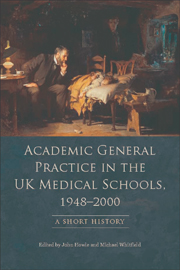Book contents
- Frontmatter
- Contents
- Preface
- Acknowledgements
- Abbreviations
- Timeline
- Introduction
- Dedication
- 1 The University of Aberdeen
- 2 The University of Dundee
- 3 The University of Edinburgh
- 4 The University of Glasgow
- 5 The Cardiff University School of Medicine
- 6 Academic General Practice in Ireland
- 7 The University of Birmingham
- 8 The University of Bristol
- 9 The University of Cambridge
- 10 The University of Exeter
- 11 The University of Leeds
- 12 The University of Leicester
- 13 The University of Liverpool
- 14 The University of Manchester
- 15 The University of Newcastle
- 16 The University of Nottingham
- 17 The University of Oxford
- 18 The University of Sheffield
- 19 The University of Southampton
- 20 The London Medical Schools
- 21 The University of St Andrews
- Appendix 1 Primary Care in the New Medical Schools
- Appendix 2 The SIFT/ACT Negotiations
- Appendix 3 An Overview
- Appendix 4 And Finally…
- Index
8 - The University of Bristol
Published online by Cambridge University Press: 05 August 2013
- Frontmatter
- Contents
- Preface
- Acknowledgements
- Abbreviations
- Timeline
- Introduction
- Dedication
- 1 The University of Aberdeen
- 2 The University of Dundee
- 3 The University of Edinburgh
- 4 The University of Glasgow
- 5 The Cardiff University School of Medicine
- 6 Academic General Practice in Ireland
- 7 The University of Birmingham
- 8 The University of Bristol
- 9 The University of Cambridge
- 10 The University of Exeter
- 11 The University of Leeds
- 12 The University of Leicester
- 13 The University of Liverpool
- 14 The University of Manchester
- 15 The University of Newcastle
- 16 The University of Nottingham
- 17 The University of Oxford
- 18 The University of Sheffield
- 19 The University of Southampton
- 20 The London Medical Schools
- 21 The University of St Andrews
- Appendix 1 Primary Care in the New Medical Schools
- Appendix 2 The SIFT/ACT Negotiations
- Appendix 3 An Overview
- Appendix 4 And Finally…
- Index
Summary
The medical faculty of the University of Bristol was slow to accept that general practice has a role in teaching medical students and was the last of the pre-2000 medical schools in the UK to create an academic undergraduate post occupied by a general practitioner. The story behind this development is interesting and illustrates the way that tradition can be challenged and eventually altered.
In the early 1960s, Bristol's professor of public health and medical officer of health, Robert Wofinden, created a name for himself with the development of health centres. He saw this as a way of bringing together general practitioners, nurses, midwives and health visitors to improve the health of patients in various parts of the city. At the same time Michael Lennard, a relatively recent Bristol graduate, was working in general practice in Hartcliffe, a new estate in the south of the city, and was keen to introduce medical students to general practice. In 1963 Sandy Macara (later president of the BMA) was appointed lecturer within the small public health department and given the responsibility for running a four-week general practice clerkship. In 1965 the southwest faculty of the College of General Practitioners sent a memorandum of evidence to the medical curriculum review committee of the university stating ‘we strongly urge the setting up of a department of general practice as a logical step in the development of undergraduate medical education’.
- Type
- Chapter
- Information
- Academic General Practice in the UK Medical Schools, 1948-2000A Short History, pp. 37 - 39Publisher: Edinburgh University PressPrint publication year: 2011



